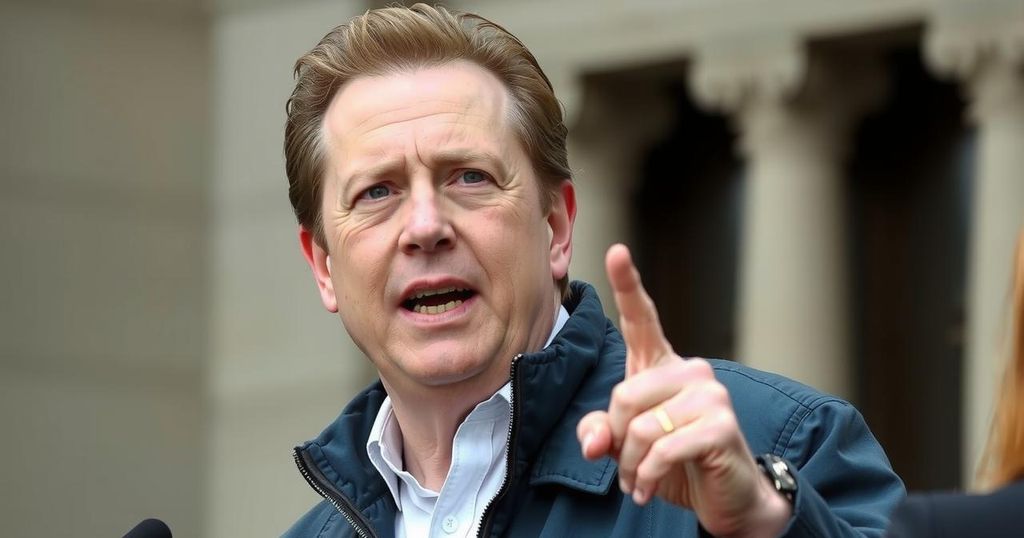Elon Musk has publicly endorsed the far-right AfD party in Germany, claiming it is crucial for the country’s future amidst economic challenges. His comments have drawn widespread condemnation from German politicians and media, raising questions about foreign influence in elections. Published in the Welt am Sonntag, Musk’s op-ed illustrates significant tensions regarding the role of media in political discourse and the potential normalization of extremist views.
Elon Musk, the billionaire CEO of Tesla and SpaceX, recently expressed his support for Germany’s far-right Alternative for Germany (AfD) through an op-ed published in the Welt am Sonntag. Musk characterized the AfD as Germany’s “last spark of hope,” claiming the country is facing an impending “economic and cultural collapse.” He argued that the party’s policies could facilitate a revival of the German economy while ensuring a controlled immigration policy to maintain national identity. Musk faced backlash from various political figures and the media, as many condemned his views as destabilizing and promoting right-wing extremism. This op-ed, while legally allowed under German law, raised important questions about the role of media in political discourse and the intersection of personal agendas with electoral politics.
In recent days, Musk’s claims have ignited a furor in Germany, with prominent politicians condemning his interference in German politics. Friedrich Merz, the center-right chancellor candidate, criticized Musk’s remarks as invasive, suggesting they demonstrate an unsettling intrusion into national affairs. Conversely, Lars Klingbeil, leader of the center-left Social Democrats (SPD), likened Musk to Vladimir Putin, asserting that both individuals aim to disrupt democratic processes in Germany. Musk’s op-ed was published despite internal protests within the Welt editorial team, leading to the resignation of a senior editor over ethical concerns.
The backdrop to this controversy is the current political landscape in Germany, where the AfD is polling at around 20%, making it a significant player in the upcoming elections. Historically, German media has prided itself on its objectivity, particularly public broadcasters, which are mandated to maintain impartiality. Nonetheless, freedoms enshrined in Germany’s Basic Law allow for personal expressiveness within journalistic frameworks, prompting discussions on the influence and responsibilities of media outlets, particularly regarding affiliations with populist factions.
Musk’s motivations have been scrutinized, with critics suggesting that economic interests drive his support for the AfD. The AfD’s economic agenda aligns with Musk’s corporate goals, particularly in relation to his Tesla factory located in Brandenburg. Moreover, his influence is not limited to Germany, as he has supported far-right movements elsewhere, raising concerns about the broader implications of his public endorsements. As a figure with substantial reach on social media, Musk’s support could potentially legitimize and embolden the far-right narrative within Germany, paving the way for increased visibility and acceptance of these views.
In conclusion, Elon Musk’s op-ed endorsing the AfD has sparked significant controversy within Germany, underscoring the delicate balance between freedom of expression in media and the ethical considerations surrounding political endorsements. Musk’s intervention raises critical questions about foreign influence in local elections and the potential for media to either propagate or challenge radical political ideologies. As the election approaches, the ramifications of Musk’s support for the AfD may shape the political landscape in ways that resonate beyond Germany’s borders.
“The portrayal of the AfD as right-wing extremist is clearly false… Does that sound like Hitler to you? Please!” – Elon Musk
“Both want to influence our elections and specifically support the AfD’s enemies of democracy.” – Lars Klingbeil
https://www.dw.com/en/german-election-why-elon-musk-promotes-the-far-right-afd/a-64932026
Title: “Elon Musk’s Support for AfD: A Controversial Political Endorsement in Germany”
The far-right Alternative for Germany (AfD) has gained traction in recent years, particularly amid concerns about immigration and economic challenges facing the nation. Elon Musk’s endorsement of the party, made in an op-ed published in the conservative newspaper Welt am Sonntag, has ignited outrage among political leaders and journalists. The backlash reflects broader issues related to foreign influence on German elections, media ethics, and the shifting landscape of political discourse in Europe.
The controversy surrounding Elon Musk’s op-ed endorsing the AfD highlights significant tensions in German politics regarding media influence and foreign involvement in domestic affairs. As the political climate becomes increasingly polarized, Musk’s actions may have lasting implications, potentially normalizing extreme political ideologies and affecting Germany’s electoral integrity. This situation underscores the importance of scrutinizing the intersection of media, politics, and personal agendas in democratic societies.
Original Source: www.dw.com






